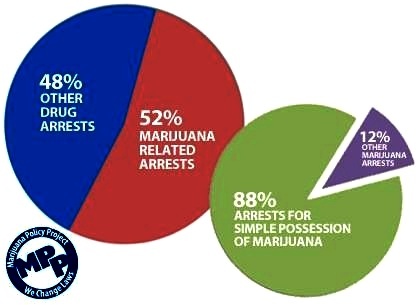How could a legislative body be so stupid for thirty years? The Marijuana Policy Project found that legislators assumed 30% of their voters supported legal medical marijuana. The reality was the reverse. That's quite a bit more than a 15 point difference. That's being deliberately stupid, or else ignoring the will of those who elected legislators in order to grease the palms of those with access to power.
hmmm. So who has problems discerning reality from fantasy... the marijuana legalization supporters or the legislators who only hear from people who want to keep marijuana illegal, such as military/industrial contractors. Claire McCaskill noted in a June 2011 Senate subcommittee report finding that the drug war has largely failed and those who most benefitted from it were not held accountable for the funds that American taxpayers are forced to provide for policy they don't want for machinery used to poison the ground water of rural people in Mexico and finance covert activities through policy that the people of Mexico and their elected leaders oppose.
Is that imperialism or just another scam on the American taxpayer by those who lobby to keep these failed policies intact? Or... are they pretty much the same thing?
Five major defense contractors received the bulk of drug war contract spending: Raytheon, Lockheed Martin, DynCorp, ARINC and ITT. Out of all the firms, DynCorp benefitted most, winning $1.1 billion.
http://www.rawstory.com/rs/2011/06/10/senate-report-war-on-drugs-failed/
"It's becoming increasingly clear that our efforts to rein in the narcotics trade in Latin America, especially as it relates to the government's use of contractors, have largely failed," Sen. Claire McCaskill (D-MO), chair of the Senate Subcommittee on Contracting Oversight, said in a media advisory. "Without adequate oversight and management we are wasting tax dollars and throwing money at a problem without even knowing what we're getting in return."
The McCaskill report indicates that U.S. taxpayers have shelled out over $3 billion for work and equipment related to the drug war in Latin America from 2005-2009, and most of that money went to private contractors.
McCaskill launched the inquiry after looking into counternarcotics efforts underway in Afghanistan. However, neither the Department of Defense nor the State Dept. were able to provide adequate documentation on their contracts and in many cases could not even identify firms that were given millions in tax dollars.
At the national level, marijuana arrests allow law enforcement to fluff their statistics and receive federal funding.

 = new reply since forum marked as read
= new reply since forum marked as read
